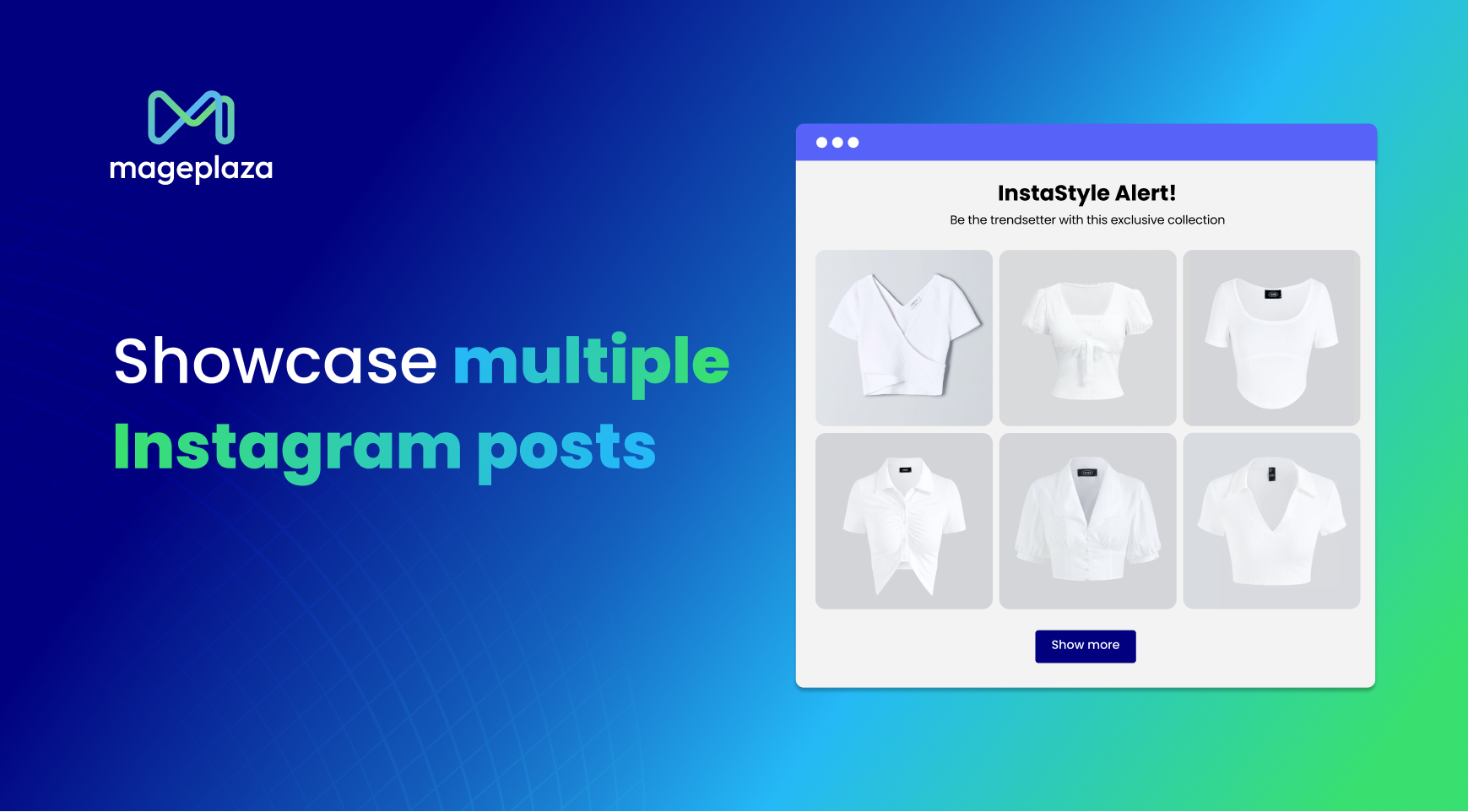Shopify vs. Instagram Shop – Pros, Cons, and Performance
03-17-2025

Are you struggling to make a decision between choosing Shopify and Instagram Shop to build your own online store? You want smooth functionality, great performance, and the highest return on investment (ROI), but it’s too tricky to figure out which one fits your business goals the best?
It’s truly a tough choice but don’t worry! We will thoroughly compare Shopify vs Instagram Shop, revealing their pros, cons, and performance data to help you find the best fit.
Whether you’re a new business owner or an experienced one, this in-depth comparison will help you choose to take your online success to a whole new level. Let us work through the difficulties together and find the way to great e-commerce.
Shopify vs Instagram Shop: Main differences
The main difference between Shopify and Instagram Shop is how you can control and use them:
Shopify is a full-fledged e-commerce platform. You create your own online store with a shopping cart, payment processing, inventory management, marketing tools, and more. It’s like having your digital storefront, giving you complete control over the branding and customer experience.
Instagram Shop is an Instagram Feed integration within the Instagram app. You can tag products in your posts and stories, allowing users to learn more and buy directly on Instagram. It’s a convenient way to sell on a platform where people are already browsing and discovering products. However, you have less control over the look and feel of your shop compared to Shopify.
Pros and Cons of Shopify vs Instagram Shop

You should think carefully about the pros and cons before deciding on an option, especially when there are other competitors like Shopify and Instagram Shop. Allow us to simplify things for you: which one is most suitable for your requirements?
Shopify
Pros:
-
User-Friendly Interface: Shopify boasts an intuitive setup suitable for beginners, enabling the creation of online stores without extensive technical knowledge.
-
Customization Options: Shopify offers a diverse range of customizable themes and templates, allowing users to craft visually appealing storefronts aligned with their brand identity.
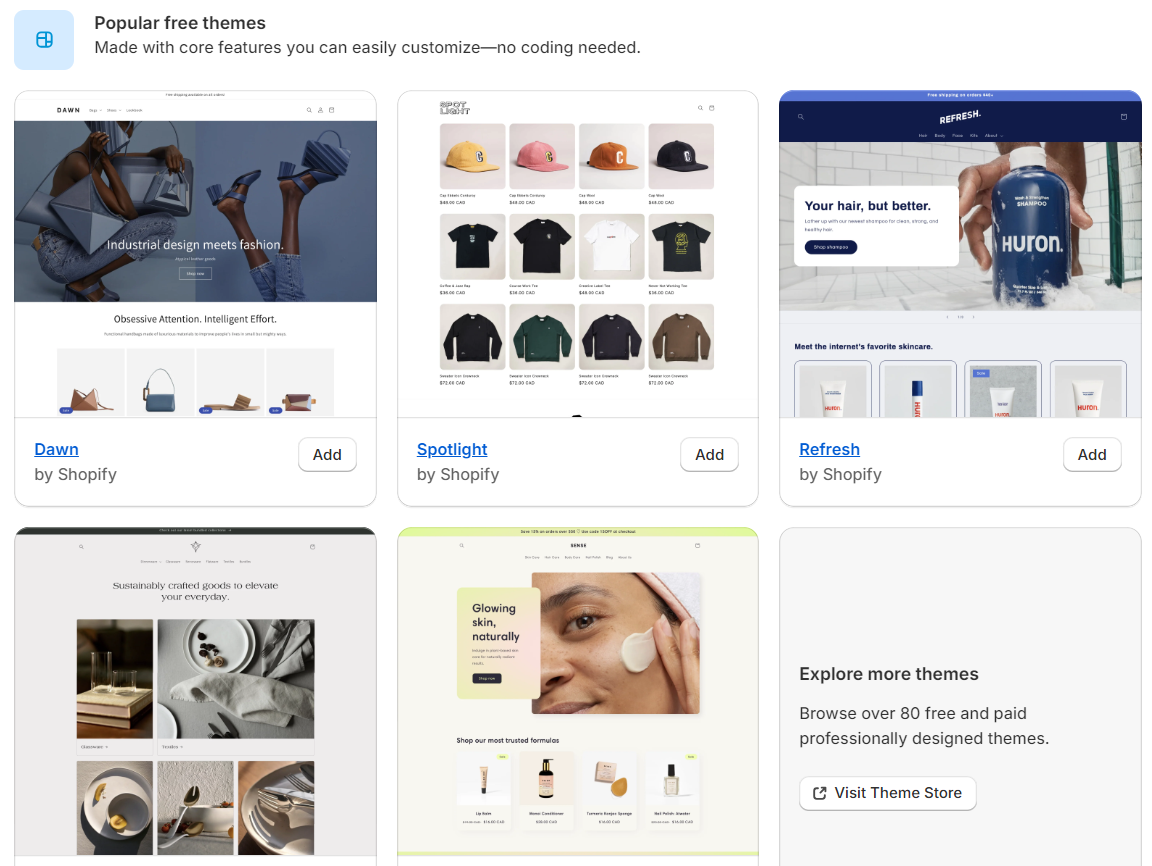
-
Scalability: Shopify accommodates business growth seamlessly, offering scalability options to handle increasing product ranges, traffic, and sales without disruptions.
-
App Ecosystem: With a vast marketplace of apps and plugins, users can enhance their store’s functionality, integrate third-party tools, and optimize Shopify e-commerce operations.
-
Payment Flexibility: Multiple payment gateways are supported, Shopify ensures a smooth checkout experience for customers and enables diversification of payment methods.
-
Marketing Features: Built-in marketing tools such as SEO optimization, social media integration, and email campaigns facilitate product promotion and audience reach.
-
Customer Support: Reliable support is available through various channels including live chat, email, and a knowledge base, Shopify ensuring assistance whenever challenges arise.
Cons:
-
Transaction Fees: Transaction fees are incurred for each sale unless using Shopify Payments, potentially impacting profit margins, especially for high-volume sales.
-
Not Easy To Set Up: Setting up and managing a Shopify store can be more complex compared to Instagram Shop.
Instagram Shop
Pros:
-
Streamlined Checkout: Instagram Shop simplifies the purchasing process by allowing users to combine items from different shops in the Instagram Cart and complete transactions within the app.
-
Easy-to-use Interface: With the same interface as Instagram, this platform is user-friendly for individuals familiar with the social media platform.
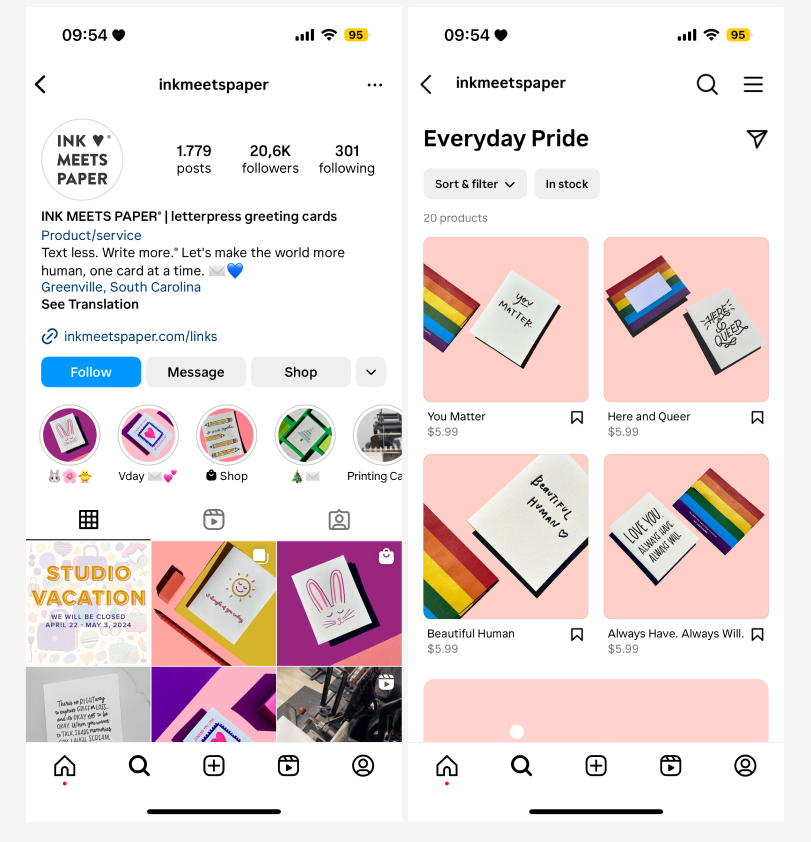
-
Advanced Mobile Shopping: Products can be seamlessly connected to posts and ads, facilitating easy visualization and purchase for customers, who can add items to their cart or visit the website effortlessly.
-
SwiftTransactions: Stored information streamlines checkout, making adding to the cart and finalizing purchases a quick, one-click process.
Cons:
-
Transaction Costs: Similar to Shopify, transaction fees may impact profitability despite potential sales boosts.
-
Poor Customer Insight: Brands receive only basic order data, as Instagram handles notifications, returns, and refunds, reducing direct engagement.
-
Limited Customization & Support Tools: Dependent on Instagram’s development, the platform offers limited customization and marketing tools for business owners.
Both Shopify and Instagram Shop offer unique benefits and drawbacks, catering to different needs and preferences of businesses in the e-commerce landscape.
Detail Comparison of Shopify vs Instagram Shop
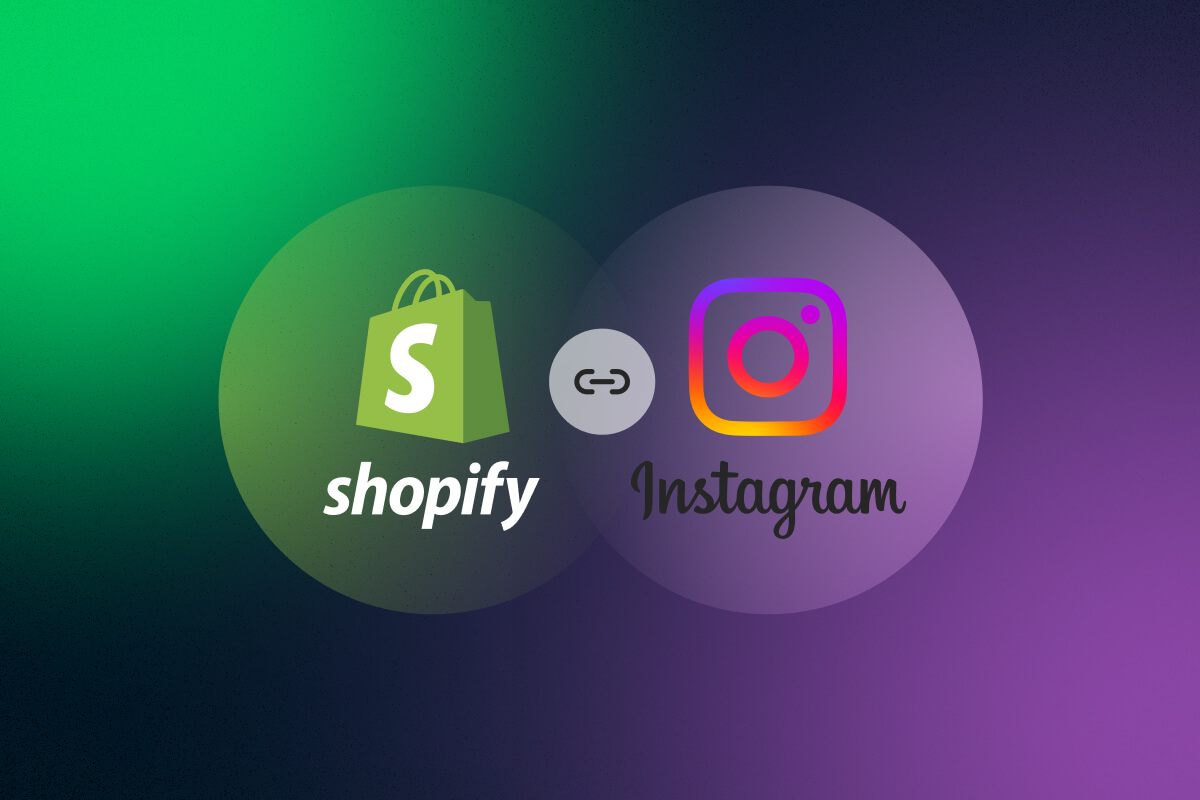
Pricing
Shopify
1. Subscription fees
Shopify offers a variety of subscription plans, tailored to suit different business needs, ranging from $29 to $2,300 per month. Your plan choice depends on factors like the scale of your product range, expected sales volume, and desired features.
If you’re new to Shopify, there’s a special offer: you can fully experience the platform for free for three days. After that, you can continue using it for just $1 per month in the next 3 months.
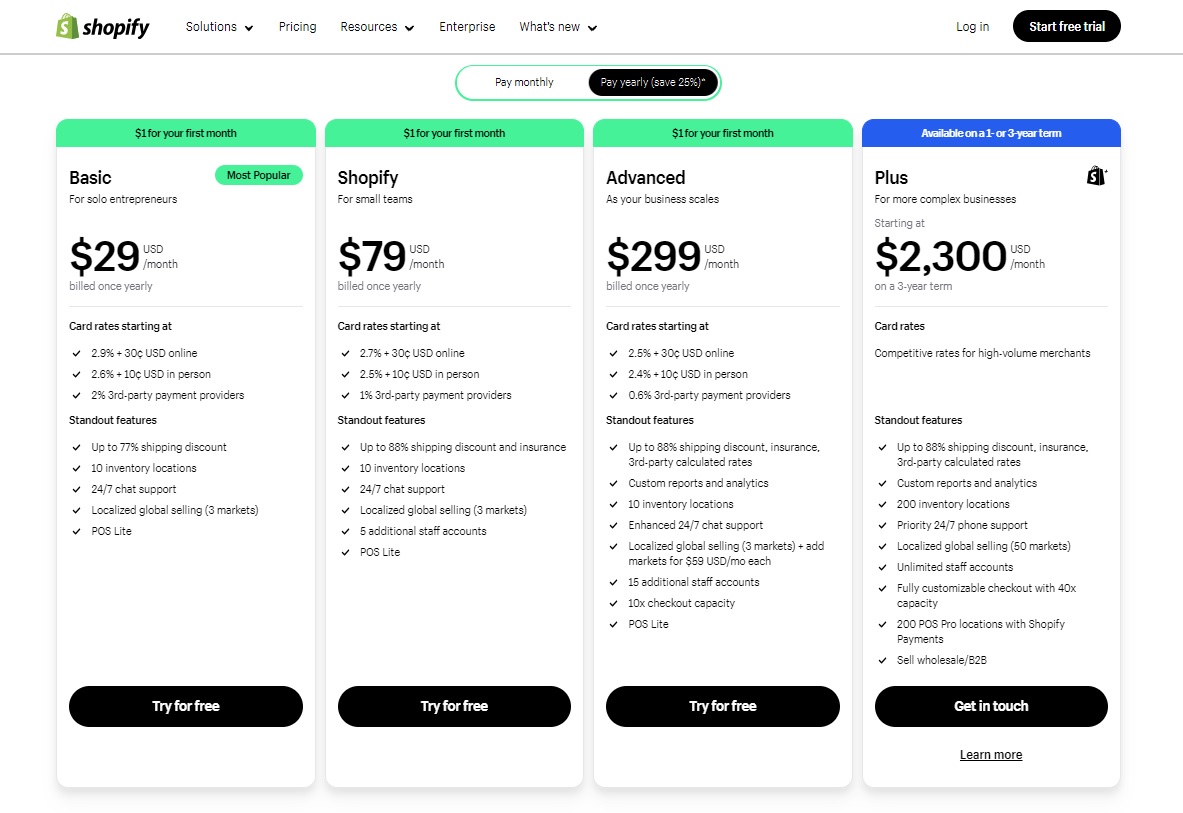
2. Transaction Fees
For each sale made through your store, Shopify charges transaction fees ranging from 0.5% to 2%, depending on the specific plan you’ve chosen. However, by using Shopify Payments, an integrated payment gateway, you can bypass these fees and potentially increase your profit margins.
3. Additional Fees
Apart from the basic subscription and transaction fees, there may be additional expenses to consider. These could include integrating third-party apps to enhance your store’s functionality, custom theme design, and external services for tasks such as marketing or advanced analytics.
Sign Up Now and Get 3 Months for Only $1/Month
Instagram Shop
1. Subscription Fees
Signing up for Instagram Shop is free, but you’ll need to pay processing fees for your sales.
2. Transaction Fees
Transaction fees are an important aspect of using Instagram Shop. The selling fee is 5% per shipment or a flat fee of $0.40 for shipments under $8.00. This is more expensive compared to Shopify.
3. Additional Fees
In addition to the core subscription and transaction fees, it’s wise to consider potential additional expenses. These may include app integrations to enhance functionality or advertising.
To see how much Shopify and Instagram Shop cost generally, you can look at this comparison table:
| Feature | Shopify | Instagram Shop |
|---|---|---|
| Subscription Fee | Starts at $1 to $399 per month | Free |
| Transaction Fee | 0.5% to 2%, depending on your plan | 5% per shipment or $0.40 (under $8) |
| Additional Fees | Apps, themes, marketing tools | Optional app integrations, ads |
| Overall Cost | Potentially lower for high-volume sales | Potentially higher for high-volume sales |
=> Who is suitable for Shopify? Large businesses with high-volume sales, aiming for a long run.
=> Who is suitable for Instagram Shop? Small businesses with low-volume sales and a limited budget to start with.
Sales Features
Shopify and Instagram Shop both have sales features that are good for businesses, but they are not the same in terms of how deep and flexible they are.
1. Shipping and Fulfillment
Shopify shines in this department, offering a wide range of tools for streamlining logistical operations. From real-time shipping rates to order tracking and integration with major carriers, Shopify empowers businesses to provide efficient shipping experiences. Instagram Shop, while convenient, relies on Shopify for its shipping and fulfillment needs.
2. Inventory Management
Shopify takes the lead with robust features like real-time stock tracking and low-stock alerts, ensuring businesses can efficiently monitor and manage their inventory levels. Instagram Shop’s inventory management capabilities are still evolving and may not match Shopify’s comprehensive suite.
3. Order Management
Shopify’s intuitive system allows businesses to process orders efficiently and manage returns seamlessly. Instagram Shop’s order management features are simpler and may need to be more suitable for businesses with larger order volumes.
4. Payment Options
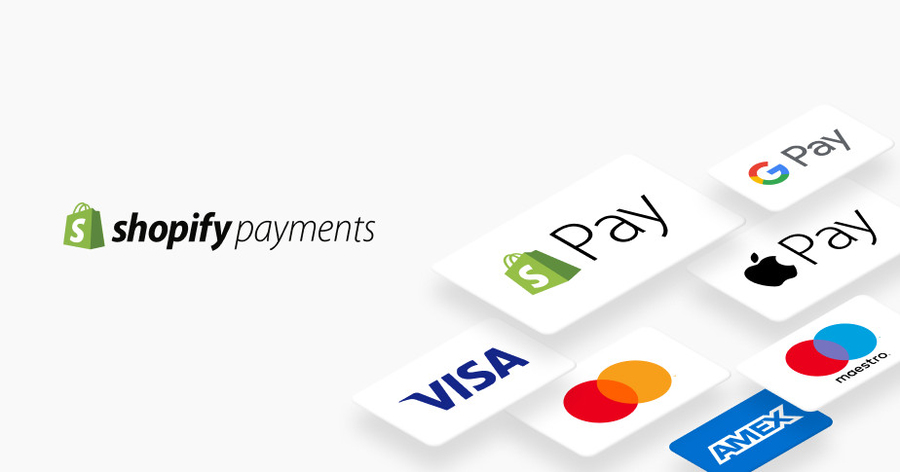
With over 100 payment gateways, Shopify offers customers a variety of payment options, enhancing the purchasing experience. While Instagram Shop integrates with Facebook Pay, its payment options may not be as extensive as Shopify’s.
Some famous payments included: PayPal, Visa, American Express, Mastercard, Discover, etc.
5. Product Promotion

Shopify excels in product promotion with built-in marketing tools and a vast app store for enhancing marketing efforts.Instagram Shop focuses primarily on product display within the Instagram ecosystem, with limited promotion tools in comparison.
6. The Verdict of Sales Features
It’s clear that Shopify is the winner for this part because it has the most tools and features. Shopify gives businesses a complete platform to improve their sales operations. It handles everything from shipping and fulfillment to stock and order management, offers many payment options, and has strong product promotion tools.
Marketing Features
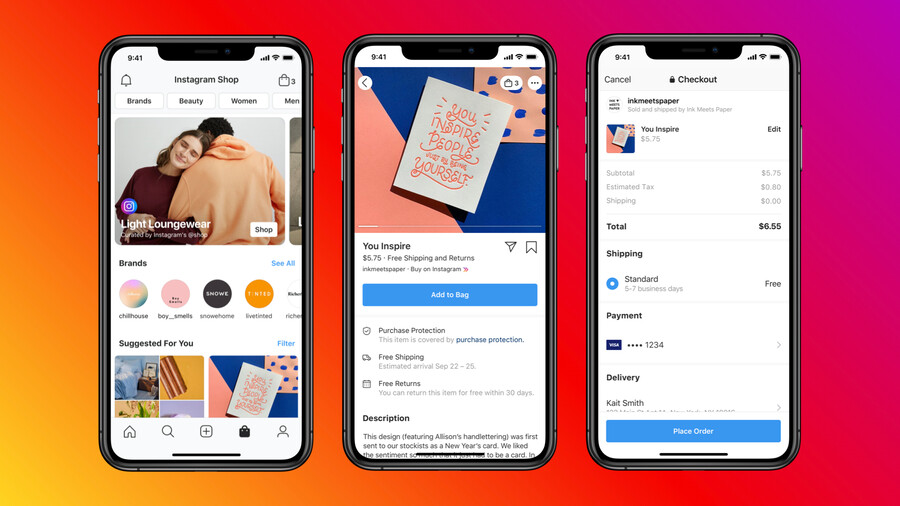
To be successful, you need to market your goods online. This is how Shopify and Instagram Shop compare when it comes to promotion features:
Shopify
- SEO & Content
Shopify equips businesses with essential SEO tools and content management capabilities. Customizable features like meta tags, URL structures, and blog integration help you get discovered in search engines and drive organic traffic. This focus on SEO works hand-in-hand with content marketing strategies, giving you a competitive edge.
- Customer Management
Shopify shines in customer management, offering robust features to track, segment, and engage your customer base. Built-in CRM tools enable personalized marketing campaigns, customer order history access, and customer support integration, fostering stronger relationships and repeat business.
- Reporting & Analytics
Shopify boasts a powerful suite of reporting and analytics tools, providing in-depth insights into sales, customer behavior, and store performance. You can track key metrics, identify trends, and refine your marketing strategies based on data.
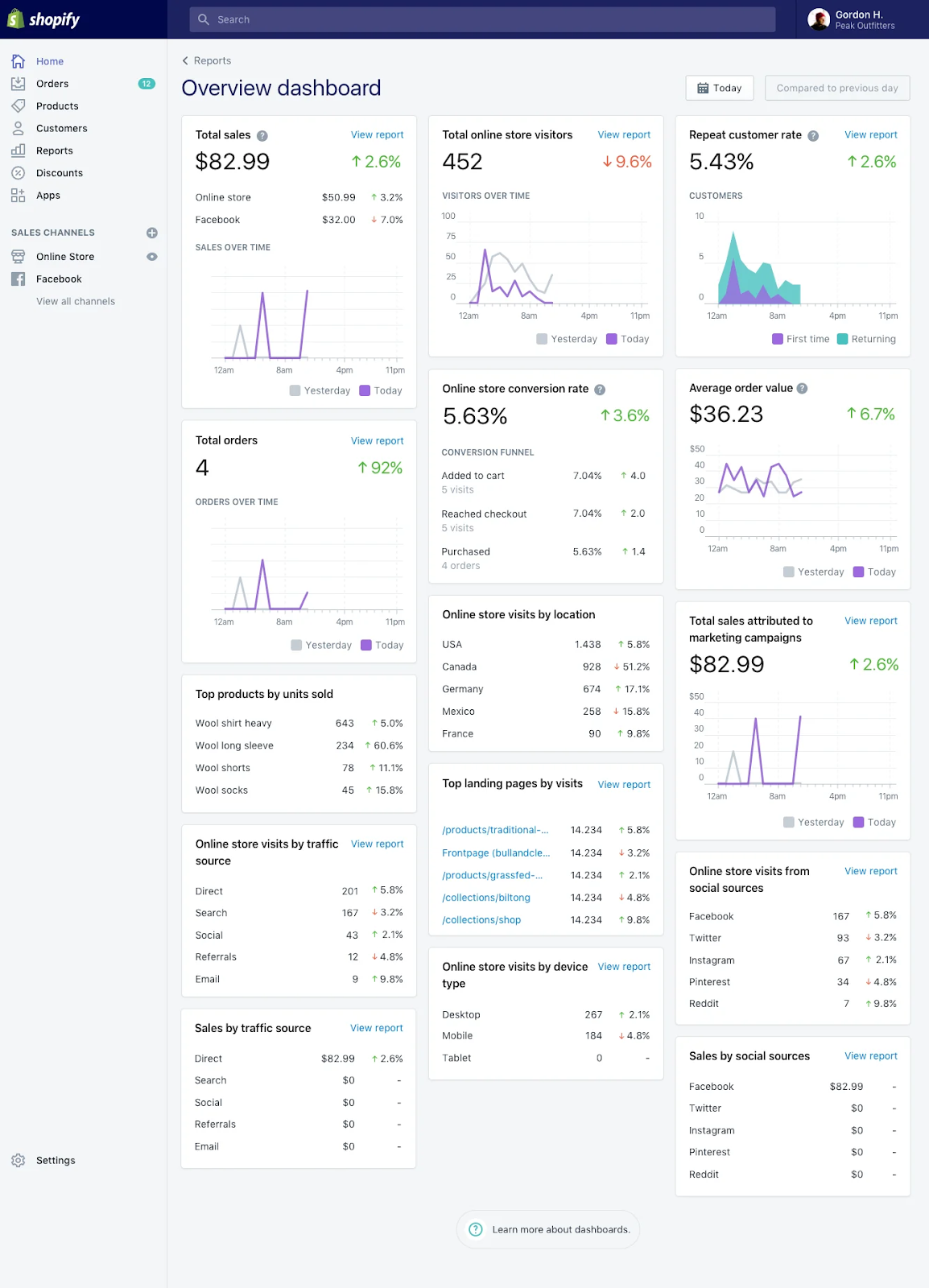
Instagram Shop
- SEO & Content
Instagram Shop prioritizes visual product display, limiting SEO and content management capabilities compared to Shopify. However, you can optimize your content for the platform by using relevant hashtags and keywords.
- Customer Management
As a relative newcomer in e-commerce, Instagram Shop offers more basic customer management features. It primarily focuses on interactions within the Instagram app itself, such as direct messages and comments.
- Reporting & Analytics
Instagram Shop’s reporting and analytics are more modest, offering basic metrics within Instagram’s ecosystem. You can track things like impressions, reach, follower engagement, and basic referral traffic data. While helpful, these don’t provide the same depth of insights as Shopify.
- The Verdict: Data Drives Decisions
Shopify takes the crown for marketing features. Its comprehensive SEO and content tools, advanced customer management capabilities, and robust reporting and analytics empower businesses to make data-driven marketing decisions for optimal results.
Apps and Integrations
Taking your online store to the next level often involves adding functionality beyond the platform’s core features. Here’s how Shopify and Instagram Shop compare in terms of apps and integrations:
Shopify
Shopify boasts a thriving app ecosystem, a treasure trove for businesses seeking to expand their online stores’ capabilities.
- Shopify App Diversity
With over 8,000 apps from third-party developers, the Shopify App Store caters to diverse needs. You’ll find apps for marketing, SEO, inventory management, customer support, analytics, and much more.
- Enhanced Integration
Boost your online store by integrating apps that add specific features. Think review systems, social media sharing buttons, loyalty programs, or live chat support – the possibilities are vast!
- Effortless Integration
Seamlessly integrate your store with various third-party services. Accounting software, email marketing platforms, payment gateways – manage all aspects of your business effortlessly.
- API Flexibility
For even greater flexibility, Shopify’s API (Application Programming Interface) empowers developers to create custom apps tailored to your specific needs.
Instagram Shop
While Instagram Shop offers some integration within the platform, it pales in comparison to Shopify’s open ecosystem:
- In-App Focus
Instagram Shop’s integrations primarily involve features within the Instagram app itself. You can tag products in posts and stories, but that’s the extent of it.
- E-commerce First
Instagram Shop’s integrations are mainly geared towards e-commerce functions within the app. The diversity and depth of features available on a dedicated platform like Shopify are unmatched.
- Limited Third-Party Options
Instagram Shop has limited capabilities for integrating with services outside the Instagram ecosystem. This can restrict your ability to optimize various aspects of your business operations.
The Verdict: A Clear Winner for Flexibility
Shopify has a much bigger and more useful community of apps than any other platform. Businesses get access to a huge number of tools and features that can help them improve their online store and make things run more smoothly. You can change this about your store to fit your wants and help it grow.
Ease of Use
Easy-to-use e-commerce platforms are particularly crucial for people who are just starting out. Which is easier to use: Shopify or Instagram Shop?
Shopify
Shopify is renowned for its intuitive and user-friendly interface, making it a favorite for businesses of all sizes. Those looking to establish an online store without technical headaches will find Shopify a breeze.
- No Coding Required
Shopify’s drag-and-drop functionality empowers anyone to design their online store, add products, and customize the layout visually, eliminating the need for coding knowledge.
- Product Management Made Simple
Adding, updating, and managing products is straightforward. Shopify offers a clear product management system where you can easily input details, images, prices, and inventory.
- Payments Simplified
Shopify integrates with a multitude of payment gateways, making checkout a smooth experience for customers. Setting up payment options requires minimal effort.
- App Power for Advanced Needs
Want more features? Shopify’s vast app ecosystem allows you to enhance your store with additional functionalities. From marketing to analytics to customer support, a wide range of third-party apps seamlessly integrate with your store.
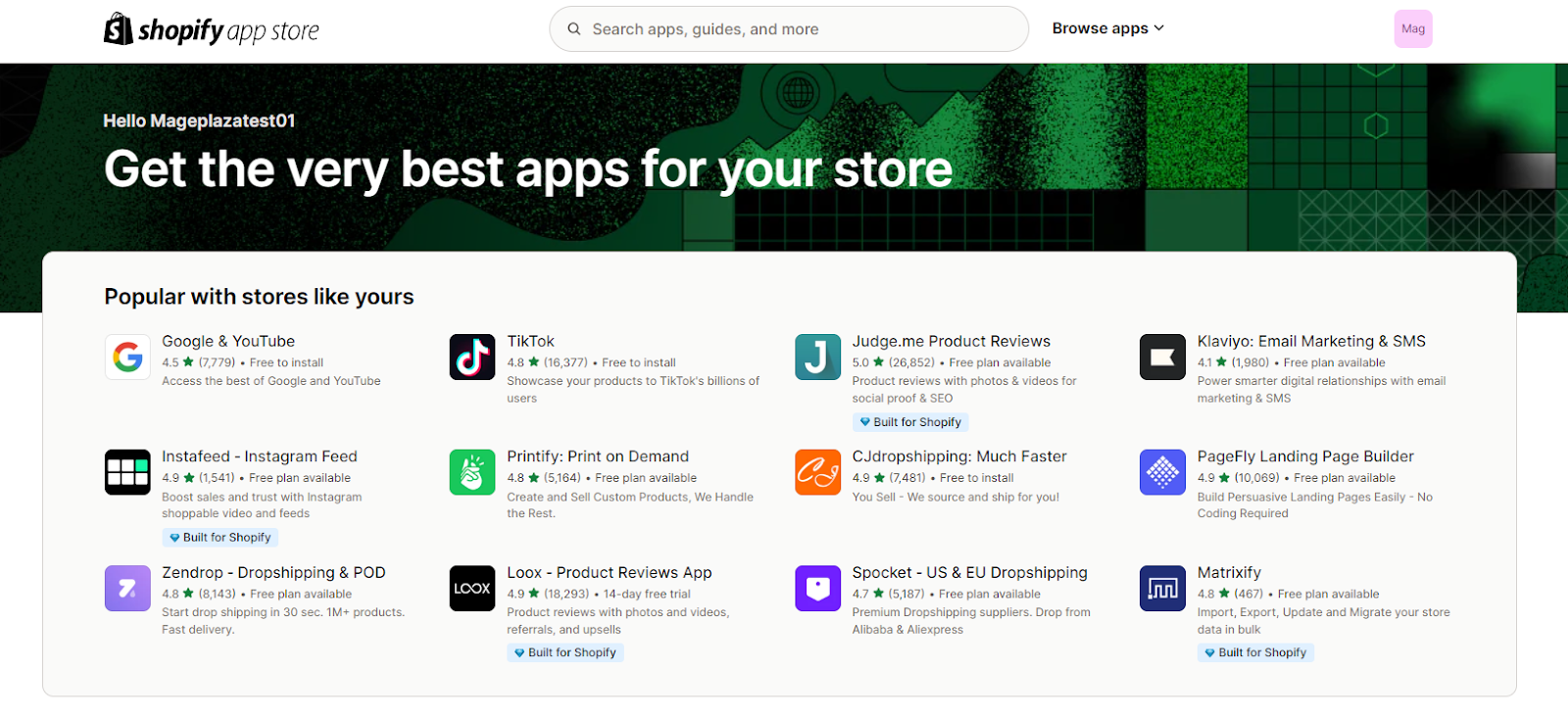
Instagram Shop
Instagram Shop prioritizes a streamlined shopping experience within the Instagram app for both businesses and customers. While easy to use in certain aspects, it has limitations compared to Shopify:
- Leveraging the Familiar
Since many businesses and customers are already familiar with Instagram, Instagram Shop allows businesses to tag products in existing posts and stories. This creates a direct shopping experience where users can click on tags to view details and purchase.
- Visual Appeal Advantage
Instagram’s focus on visual content remains a strong selling point. Businesses with visually appealing products can leverage this platform to attract and engage customers.
- Limited Customization Freedom
While Instagram Shop simplifies the shopping experience, customization options are more restricted compared to Shopify. Businesses have less control over the overall design and layout of their store within the Instagram app.
The Verdict: User-Friendliness Depends on Your Needs
For absolute beginners comfortable with Instagram, Instagram Shop offers a familiar starting point. However, Shopify provides a more comprehensive and customizable experience, even for those without technical expertise. If you prioritize full control over your store’s design and functionality, Shopify might be the better choice in the long run.
Help and Support

Running an online store smoothly requires reliable support. Here’s a breakdown of how Shopify and Instagram Shop compare in terms of help and resources:
Shopify
Shopify boasts a well-deserved reputation for its extensive help and support system, designed to guide businesses at every stage of their e-commerce journey
- Always There for You
Enjoy peace of mind with 24/7 customer support. You can reach out via live chat, email, or phone, regardless of your time zone or business hours.
- Expert Assistance
Depending on your plan, dedicated support teams can provide specialized help with technical issues, account management, and design.
- Self-Service Options
Use Shopify’s extensive knowledge base and documents to give yourself more power. You can find answers on your own and learn at your own pace. There is a lot of information available that covers everything from setting up your store to advanced customization and fixing problems.
- Learn from the Community
You can join Shopify’s bustling community and forums. Connect with other merchants, share experiences, and seek advice. Collaborate and learn from one another for a well-rounded support experience.
- Invest in Your Knowledge
Shopify has learning tools like workshops, online training, and guides that you can use to improve your skills. Learn more about things like marketing tactics, how to improve your SEO, and how to handle products well.
Instagram Shop
While integrated with Instagram, Instagram Shop offers more limited help and support options:
- In-App Focus
Instagram Shop primarily relies on in-app features like FAQs and basic troubleshooting tips for support. However, the range of issues addressed is limited.
- Platform-Specific
Instagram Shop’s support focuses solely on problems related to the Instagram shopping experience. It doesn’t provide the comprehensive e-commerce support needed for other areas of your business.
- Limited Direct Contact
Crucially, Instagram Shop lacks direct customer support channels like phone or live chat. This can be a drawback for businesses seeking immediate assistance with complex issues.
The Verdict of Clear Winner for Support
Shopify emerges victorious with its more comprehensive and robust support system. Businesses benefit from a variety of resources, expert assistance, and a strong sense of community, ensuring they get the help they need to thrive online.
Security
Security is paramount for any online business. Here’s how Shopify and Instagram Shop stack up when it comes to protecting your data and your customers’ information:
Shopify
Shopify takes security seriously, providing a robust defense system for businesses and their customers:
- Encryption Everywhere
Every Shopify plan includes a free SSL certificate. This encrypts data traveling between your customer’s browser and Shopify’s servers, safeguarding sensitive details like credit card numbers and personal information. Think of it as a secure tunnel for data transmission.
- Secure Payments by Default
Shopify’s built-in payment platforms are PCI DSS compliant, which means they follow strict rules for safe payment handling. This lowers the chance of scam and people getting into your payment information without your permission.
- Fraud Fighters on Patrol
Shopify boasts built-in fraud prevention tools to identify and block suspicious activities like fake orders or unusual transactions. These tools help protect businesses from financial losses.
- Always Up to Date
Shopify upgrades its platform with security fixes to fix problems quickly. This proactive approach keeps your business shielded from emerging threats.
- Data Backups for Peace of Mind
Shopify employs robust data protection practices, including regular backups and redundancy measures. This makes sure that your info is safe even if something bad happens.
Instagram Shop
While Instagram Shop offers a platform for selling products, its security features primarily cater to social media interactions, not e-commerce transactions:
- Limited E-commerce Infrastructure
Instagram Shop puts social features and sharing visual material first. Its e-commerce system might not have as many advanced security features as platforms like Shopify.
- Payment Security in Question
Instagram Shop relies on external payment processors, whose security standards may vary. You might have less control over payment security compared to Shopify’s integrated and PCI-compliant gateways.
- Data Focus on Users
Instagram Shop’s security measures prioritize user data privacy and content sharing. While user profiles are secure, the level of protection for your business’s transactional and operational data may be limited.
The Verdict: Shopify Takes the Security Crown
Shopify is the safest platform out there. During the e-commerce process, its thorough and focused method protects your business and customer info. Shopify gives your online store a safe base with tools to stop scams and secure connections.
Themes and Templates
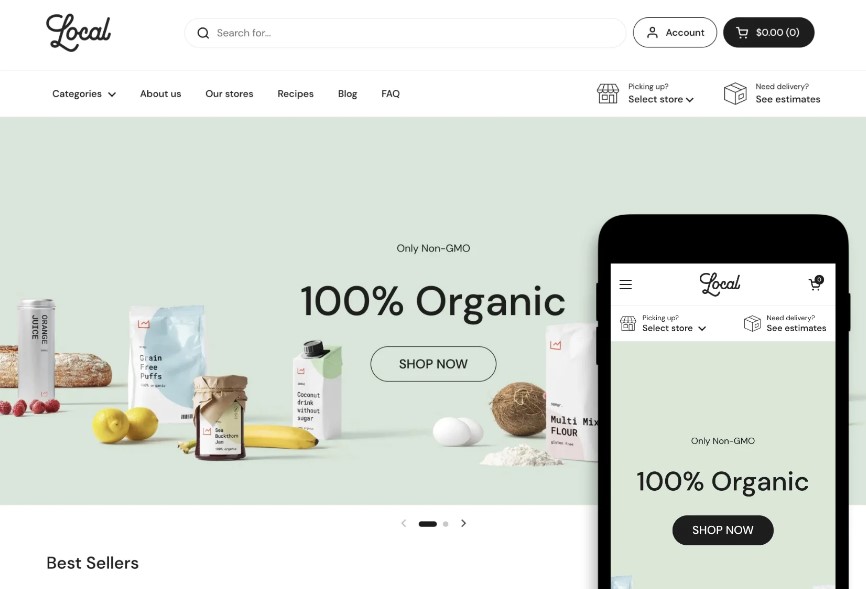
The look and feel of your online store play a crucial role in customer engagement. Here’s how Shopify and Instagram Shop stack up in terms of themes and templates:
Shopify
Shopify empowers you to create a visually stunning and unique online store that reflects your brand identity. Here’s why:
- Various Theme
Shopify’s theme boasts a vast collection of professionally designed themes (over 140!) catering to a wide range of industries and aesthetics. You’re sure to find a theme that aligns perfectly with your brand vision and resonates with your target audience.
- Tailor It to Your Taste
Shopify themes offer extensive customization options. Effortlessly modify colors, fonts, layouts, and more to create a personalized and distinctive online presence.
- Looks Great Everywhere
Shopify themes are designed to be responsive, ensuring your store looks and functions flawlessly across all devices and screen sizes. This provides a seamless user experience for customers, no matter how they choose to browse.
- Mobile Marvels
Shopify knows that mobile shopping is popular, so it makes sure that its styles are mobile-friendly. Customers who are on the go will be able to see and experience your shop perfectly on smartphones and laptops.
- Go Beyond the Official Collection
In addition to Shopify’s official themes, you can explore a world of third-party themes on the Shopify Theme Store and other marketplaces. This opens doors for even greater customization and creative freedom.
Instagram Shop
While Instagram Shop offers some level of customization, its theme options are more restrictive compared to Shopify:
- Visual First
Instagram Shop’s templates prioritize visual content, ideal for showcasing products within the Instagram app. However, this focus might not translate well to a comprehensive online store with all the necessary e-commerce features.
- Limited Control
Businesses can tag products in Instagram Shop posts and stories, but customization options are limited. This can be a challenge for businesses with unique branding requirements or specific design visions.

- Seamlessly Integrated
Instagram Shop’s themes are tightly integrated with the Instagram platform, offering a smooth shopping experience within the app. However, this integration sacrifices the flexibility and versatility of a standalone e-commerce platform like Shopify.
The Verdict: Shopify Is Perfect for Customisation
Shopify is the best option for businesses that want an online store that can be easily customized and looks good. Its wide range of themes, advanced customization tools, and focus on mobile devices make it easy to make a store that truly represents your brand and grabs customers’ attention.
Comparison Table of Shopify vs. Instagram Shop
If you like to shop online, picking the right site is very important. We’re going to compare Shopify and the newest Instagram Shop (2024) today to help you make your choice.
| Factor | Shopify | Instagram Shop |
|---|---|---|
| Pricing | For monthly plans ($1-$299), transaction fees apply | Free to set up, selling fees apply |
| Sales Features | Extensive features: discounts, coupons, abandoned cart recovery | Basic features: product tagging, collections |
| SEO & Marketing | Full control over SEO integrates with email marketing tools | Limited SEO control, built-in promotion tools for Instagram |
| Apps & Integrations | Huge app store with thousands of options | Limited integrations, mostly focused on marketing and social media |
| Ease of Use | Beginner-friendly, drag-and-drop interface | Straightforward for product tagging, limited customization freedom |
| Scalability | Highly scalable, can handle large product catalogs and traffic | Limited scalability, better for smaller businesses or specific product lines |
| Help & Support | 24/7 live chat, phone, email, and extensive knowledge base | Basic support through Instagram's help center |
| Security | Secure platform with PCI compliance | Leverages Instagram's security infrastructure |
| Themes & Designs | Wide variety of paid and free themes, extensive customization options | Limited theme selection, focus on mobile-friendliness |
Here’s our take:
- Go for Shopify if:You need complete control over your store, plan on scaling your business, or require advanced features like SEO and abandoned cart recovery.
- Choose Instagram Shop if: You have a small product line, prioritize a visual-first experience, and leverage a strong Instagram presence for sales.
However, you can still optimize your Shopify store appearance with Instagram’s visuals by using Instagram Feed apps.
Remember:
- Shopify takes some time to learn, but it gives you greater flexibility.
- Instagram Shop is easy to use, but you can’t make many changes to it.
Whatever your wants and goals are, the best platform will be different for each person.Before you make your choice, you should think about your budget, product type, and target audience.
FAQs
Does Instagram Shop use Shopify?
No! Instagram Shop isn’t powered by Shopify, it’s a separate feature within the Instagram app. But the good news is, that you can connect your Shopify store to Instagram Shop. This lets you sync your products, tag them in posts and stories, and manage everything from a central location. It allows you to leverage Instagram’s huge audience to drive sales directly to your Shopify store, making it a powerful tool for e-commerce businesses.
What Shop platform is best for Instagram?
Because Instagram Shop is designed to work perfectly with the Instagram app, it’s the best choice for businesses that want to use their current Instagram community. But if you need more e-commerce features, customization options, and the ability to grow, Shopify is the best choice. It’s an effective platform that can connect to Instagram and has additional options.
Is Shopify the only way to sell on Instagram?
Shopify is not the only way to sell on Instagram. Instagram Shop offers a smooth purchasing experience inside the app. This lets companies exhibit their items, create a virtual shop, and handle transactions without leaving Instagram. While Shopify remains a widely utilized platform for e-commerce, Instagram Shop offers an integrated solution tailored specifically for businesses aiming to leverage the Instagram platform for sales.
Is Instagram Shop effective?
Yes! Instagram Shop can be a sales booster for Instagram-savvy businesses with a manageable product range. It lets followers discover and buy directly in the app, making purchases frictionless. However, for complex catalogs or long-term plans, its limited features might not suffice. You can think of it as a sales spotlight for your current audience. It works well for making a quick impact, but Shopify is a better choice for a scalable e-commerce base.
Mageplaza Instagram Feed for Shopify
Engage visitors, build trust, and customize effortlessly. Streamline tasks and boost interaction.
Check it out!
Final Thoughts on Shopify vs Instagram Shop
For online shopping, Shopify is better than Instagram Shop . Although Instagram Shop is free and useful for Instagram users who already have a small selection of products, it is not as detailed or customizable as Shopify. With advanced features like SEO, abandoned cart recovery, and more customization choices, Shopify gives you a full-fledged online store. It can be easily expanded, which makes it perfect for companies that want to grow quickly or that have a lot of products to manage. Connecting your Shopify store to Instagram Shop, on the other hand, lets you show off your goods and make sales straight through Instagram’s huge audience. Hopefully, this article has given you useful information about these two famous e-commerce platforms to make the best decision.




